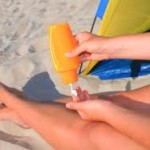Protecting Your Family Against the Sun’s Rays
 Summer is just about here officially! With summer comes sunshine! Summer weather brings many people outdoors to enjoy the sun's warmth because sunlight helps our bodies create Vitamin D. Spending time in the sun though without the proper protection exposes the skin to harmful ultraviolet radiation. Sun exposure can cause injury to the skin. Long term sun exposure, even without sunburn, can cause harmful effects and has been associated with skin cancer, blotchy and leathery skin, wrinkles, and brown age spots.
Summer is just about here officially! With summer comes sunshine! Summer weather brings many people outdoors to enjoy the sun's warmth because sunlight helps our bodies create Vitamin D. Spending time in the sun though without the proper protection exposes the skin to harmful ultraviolet radiation. Sun exposure can cause injury to the skin. Long term sun exposure, even without sunburn, can cause harmful effects and has been associated with skin cancer, blotchy and leathery skin, wrinkles, and brown age spots.
According to Dangers of the Sun, it is said that one out of every five Americans will develop skin cancer in their lifetime. They give the following tips to protecting yourself against from the sun's harmful rays:
- Wear a hat or bandana to protect your head.
- Wear sunglasses
- Apply sunscreen before going out in the sun. This gives the ingredients time to absorb into your skin and work more effectively. Sunscreen SPF 15 or higher is always recommended.
- Avoid staying out in the sun too long and reapply sunscreen every few hours.
- The sun's rays are strongest between 10:00a.m. and 4:00p.m. so use extra caution during these times.
- See a dermatologist once a year for check ups.
 One of the best ways to protect your family from the sun is to cover up and shield skin from UV rays. Infants are most at risk for sun burn because they have thinner skin and underdeveloped melanin which makes them burn much more easily than older children. Children under the age of 6 months though should not use sunscreen because of their sensitive skin and should be kept out of the sun when ever possible. Two items to invest your money in for long summer days out in the sun are umbrellas or sun tents. These are great for a day at the beach!
One of the best ways to protect your family from the sun is to cover up and shield skin from UV rays. Infants are most at risk for sun burn because they have thinner skin and underdeveloped melanin which makes them burn much more easily than older children. Children under the age of 6 months though should not use sunscreen because of their sensitive skin and should be kept out of the sun when ever possible. Two items to invest your money in for long summer days out in the sun are umbrellas or sun tents. These are great for a day at the beach!
Choose The Best Sunscreen:
There are a variety of sunscreens available to choose from including formulas for sensitive skin, long lasting water proof and sweat proof versions, spray bottles for easy application and even fun scents like watermelon! For children 6 months and older, it is recommended to use an SPF of 30 or higher. If you are confused by all of the varieties and do not know which one to buy, concentrate on the SPF. The higher, the better! Look for a sunscreen the protects against both UVA and UVB.
Sunscreen Tips from Kids Health – Sun Safety:
- Apply sunscreen whenever kids will be in the sun.

- Apply sunscreen about 15-30 mins before kids go outside so that a good layer of protection can form. Don't forget about lips, hands, ears, feet, shoulders, and behind the neck.
- Apply it generously.
- Reapply often, about every 2 hours as recommended by the American Academy of Dermatology.
- Reapply after the child has been sweating or swimming.
- Apply water proof sunscreen if the child will be around water or swimming. Water reflects and intensifies the sun's rays.
Preventing Heat Stroke in Kids:
Other than sunburns, another things to worry about is over heating. When body temperature rises, it makes you sick and can even threaten your life. This is called heat stroke and is a condition that can affect children. When your child is outside in the heat for extended periods of time, watch for symptoms such as skin that is hot, dry and flushed but not sweaty, headaches, dizziness, the child is disoriented, agitated, confused, or excessively tired. If your child shows any of these symptoms, get the child inside to a cool area quickly. Make sure the child drinks lots of fluids to prevents dehydration which can set in quickly in extreme heat. It is very important for parents to urge the child to take frequent breaks to drink fluids. Remove the child's clothing and fan warm air over the child while wetting the skin with luke-warm water. Call your child's doctor if symptoms do not improve.
The good news is both sunburn and heat stroke are usually preventable with the right precautions taken. What ways do you prevent over sun exposure with your kids and family?
- Why You Should Form a Nonprofit Organization - July 1, 2024
- Can You Bring Your Business A Little More Success? - June 27, 2024
- Adventure Travel: 3 Places to See - April 22, 2024


